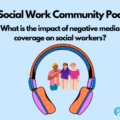
Almost two-thirds of social workers have been influenced by fear of adverse media coverage when approaching cases, a Community Care survey has found.
Of 151 respondents, almost 28% said they or a colleague had been influenced many times by the thought of the media catching wind of something going wrong with a case, while 35% said this had happened a few times.
Many reported feeling anxious and constantly second-guessing themselves when working on cases out of fear of being targeted by the media if something went wrong.
The survey, a majority of whose participants worked with children and families, also found that 70% had ‘often’ or ‘occasionally’ contemplated leaving the profession because of the negative media portrayal of social work.
Negative media coverage

Photo by iQoncept/AdobeStock
Social work has long endured negative media attention. A 2022 study of over 700 UK national newspaper articles that mentioned ‘social worker’ in a three-month period during 2019 found four times as many negative mentions as positive ones.
In the survey, practitioners criticised the media for sensationalist headlines on articles concerning child deaths and a lack of knowledge of family court processes. Most (84%) also considered the coverage of social work by UK mainstream outlets to be ‘generally inaccurate’.
One social worker commented that the stories they had encountered in mainstream media had entailed “gross stereotypes [of practitioners] who take children without any process followed”.
“[Children’s deaths] are seen [by the public] as [something that could have been] predicted by some social workers,” said another. “And [those practitioners] are then treated worse than those who actually caused the harm.”
The case of Finley Boden
In recent years, social workers have been a major focus of the reporting on child death cases such as those of Arthur Labinjo-Hughes, Finley Boden and Star Hobson.
Survey respondents particularly highlighted the case of Finley, who was murdered by his parents on Christmas Day, 2020, just 39 days after he had been returned to their care.
Choose Social Work
This survey was part of Community Care’s Choose Social Work campaign, which aims to champion the brilliant work social workers do every day, inspire the next generation of practitioners and counteract the negative media coverage of the profession.
Read about why we’ve launched this campaign, and the five steps you can take to support it.
More articles from the campaign:
- ‘We never hear about the children social workers help’: a day in the life of a social work team
- ‘It was wonderful to have somebody show me they really cared’
- When social work becomes a family affair
- ‘The advice that has stayed with me through my social work career’
- ‘You can literally change a young person’s life’: an 18-year-old’s message for social workers
- ‘What I wish I’d known before becoming a social worker’
- Jenny Molloy: ‘Social workers have been so important in my life’
The most quoted example was of the BBC initially headlining its story, ‘Parents murdered baby returned by social services’.
However, as its story explained, Finley had been returned in accordance with a court order involving an eight-week transition from care, despite social workers’ recommendation that the move take six months. The BBC subsequently changed its headline to, ‘Parents murdered baby placed back in their care’.
“The headline on BBC implied social services had returned a child to be murdered,” said one respondent. “However, the article clearly stated the social workers were arguing to prevent the return or at least to slow it down.”
Another respondent, referring to this and other articles, said that “[there was] no context of how the law works or the limits of what social workers can do, when other professions have a responsibility as well”.
The BBC has been approached for comment.
‘The stress affects decisions on right and wrong’

Photo: NDABCREATIVITY/Adobe Stock
However, the survey also highlighted the ongoing impact of negative media coverage after reporting of cases had ended.
More than half (58%) of social workers said that high-profile cases like Finley’s had had a very negative impact on public attitudes to the profession in their area. A further 28% said they had had a slightly negative impact.
Following Arthur Labinjo-Hughes’ death and his parents’ trial, the then chief executive of Solihull Council, Nick Page, revealed that social workers in the borough had faced such abuse that some had had to leave their homes.
Survey respondents’ comments described a resulting culture of fear, self-preservation and practitioners second-guessing themselves, scared they would one day find their photo on the front pages.
‘Social workers are always fearful’
“Social workers in the UK are always fearful and have a saying about not being on the Daily Mail,” said one respondent.
“The stress affects decisions on right and wrong and eventually health. I developed high blood pressure after joining [the sector]. No one wants to talk about social workers being affected mentally, no one assesses the effect.”
In one example, a social worker described taking extreme measures to protect their and their family’s anonymity.
It terrifies me that the job I do might lead to my family being impacted.”
“I have had to take measures to not share my address. I’m not able to just go and pick up a prescription as they want your address.
“I have taken myself off the electoral, I have chosen to work outside of the area I live in, which means more travelling and time away from my family. My social media is private and I don’t check in locally.”
Another spoke of keeping a notepad on their nightstand for nights when they woke up from stress, worried they would forget to do something for a case.
“You constantly work under the pressure of always ‘covering yourself’. This pressure leads many, myself included, to wake up during the night thinking, ‘I must do this, that’. I and others I know have had notepads by our beds so if we wake up we can write down these things.”
Defensive practice
The influence of the media has also manifested in social workers’ relationships with parents.
“Families have no trust in social workers or the service,” said a practitioner. “So social workers have to work harder to try and support them. [Families] are often suspicious of us, [there is a lot of] fear when meeting a social worker for the first time.”
Comments also indicated a trend of “defensive practice”: social workers becoming excessively cautious due to a fear of being blamed.
“Our systems and processes often feel like they are designed around this, rather than what is best for a family, whether the individual worker recognises this or not,” said a respondent.
“I feel it has made us more risk-averse in deprivation of liberty cases,” said another. “Professionals are so worried about managing the risk to themselves if something happens that the impact on the child gets lost.”
Seeking to change media coverage
In the past year, the British Association of Social Workers and the Social Workers Union (SWU) have been actively trying to counteract negative media coverage of social work.
Last year, BASW launched its own journalism awards to promote good reporting of social work, while SWU has developed media reporting guidelines in collaboration with regulator the Independent Monitor for the Press (Impress).
However, Anthony Dhadwal, BASW’s senior press officer, said some mainstream media organisations “do not care for balance, but look to scapegoat”.
“While we always challenge these outlets through media law, the problem is that damage has already been done by the time they retract or amend their damaging articles.”
“Social workers are on the front line of helping the most vulnerable in society and we have to accept that our role will come under scrutiny,” added SWU general secretary John McGowan.
“However, unlike colleagues in other public services, social workers tend not to receive balanced coverage in the media,” he said.
“Our media guidelines developed with regulators have made a start in trying to ensure social workers are treated more fairly by the media, but addressing the wider media landscape is a much bigger issue.”
Do you want to share how negative media coverage of social work has affected you? Email our community journalist at anastasia.koutsounia@markallengroup.com






 Family help: one local authority’s experience of the model
Family help: one local authority’s experience of the model  ‘I spent the first three months listening’: how supportive leadership can transform children’s services
‘I spent the first three months listening’: how supportive leadership can transform children’s services  How senior leaders in one authority maintain a culture of excellence
How senior leaders in one authority maintain a culture of excellence  How staff support ensures fantastic outcomes for children and families
How staff support ensures fantastic outcomes for children and families  Workforce Insights – showcasing a selection of the sector’s top recruiters
Workforce Insights – showcasing a selection of the sector’s top recruiters 

 Facebook
Facebook X
X LinkedIn
LinkedIn Instagram
Instagram
I would have liked to have seen more of a focus in this coverage of the most pernicious harm caused by the very deliberate media strategy of undermining confidence in public services. It is not to social workers. It is to children. It is children who live with the consequences of defensive practice, with disproportionate intervention in their family lives, with the severing or straining of familial relationships when other options could have been made to work. We make a huge mistake by not acknowledging the harm we do to children when we succumb to the fears of being named by The Daily Mail.
And the targeting of social work is deliberate, it is part of the very fabric of neoliberal politics. Again, social workers are collateral damage there (but the damage is no less real and painful, of course), with the intention more to dismantle the principles that should underpin social work; that some people are rendered vulnerable by social injustice and have a right to that being remedied. What we see now is the result of a succession of governments wanting social work to perceive itself not as a means to help people, but to catch the b*stards. It is succeeding.